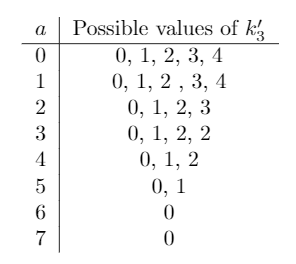Count me III
Find the number of whole number solutions to the equation such that .
The answer is 249.
This section requires Javascript.
You are seeing this because something didn't load right. We suggest you, (a) try
refreshing the page, (b) enabling javascript if it is disabled on your browser and,
finally, (c)
loading the
non-javascript version of this page
. We're sorry about the hassle.
Redefine the variables as follows a + b ( a + k 3 ) + c ( a + k 3 + k 2 + 1 ) + d ( a + k 3 + k 2 + k 1 + 1 ) = 3 0
where a , k i ∈ W (whole numbers). Note that by this definition, the condition a ≤ b < c ≤ d is always satisfied. Further note that c is defined as b + 1 + k 2 so that even when k 2 = 0 , c is not equal to b .
Simplifying this equation yields 4 a + 3 k 3 + 2 k 2 + k 1 3 k 3 + 2 k 2 + k 1 = 2 8 = 2 8 − 4 a
It follows that 0 ≤ a ≤ 7 . Also, since the RHS of the last equation and the term 2 k 2 are always even, k 3 and k 1 has the same parity, i.e k 3 ≡ k 1 m o d 2 .
Case: k 3 and k 1 are both odd 3 ( 2 k 3 ′ + 1 ) + 2 k 2 + ( 2 k 1 ′ + 1 ) 6 k 3 ′ + 2 k 2 + 2 k 1 ′ 3 k 3 ′ + k 2 + k 1 ′ k 2 + k 1 ′ = 2 8 − 4 a = 2 4 − 4 a = 1 2 − 2 a = 1 2 − 2 a − 3 k 3 ′
Note that since k 2 + k 1 ′ ≥ 0 and 1 2 − 2 a − 3 k 3 ′ ≥ 0 , the following should hold: 0 ≤ a ≤ 6 and k 3 ′ ≤ ⌊ 3 1 2 − 2 a ⌋ .
Further note that for each pair ( a , k 3 ′ ) , there are a total of 1 3 − 2 a − 3 k 3 ′ non-negative solutions ( k 2 , k 1 ′ ) . Thus, the total number of solutions is a = 0 ∑ 5 k 3 ′ = 0 ∑ ⌊ 3 1 2 − 2 a ⌋ ( 1 3 − 2 a − 3 k 3 ′ ) = 1 0 2
Case: k 3 and k 1 are both even
Solution is analogous to the previous case
3 ( 2 k 3 ′ ) + 2 k 2 + ( 2 k 1 ′ ) 6 k 3 ′ + 2 k 2 + 2 k 1 ′ 3 k 3 ′ + k 2 + k 1 ′ k 2 + k 1 ′ = 2 8 − 4 a = 2 8 − 4 a = 1 4 − 2 a = 1 4 − 2 a − 3 k 3 ′
Note that since k 2 + k 1 ′ ≥ 0 and 1 4 − 2 a − 3 k 3 ′ ≥ 0 , the following should hold: 0 ≤ a ≤ 7 and k 3 ′ ≤ ⌊ 3 1 4 − 2 a ⌋ .
Further note that for each pair ( a , k 3 ′ ) , there are a total of 1 5 − 2 a − 3 k 3 ′ non-negative solutions ( k 2 , k 1 ′ ) . Thus, the total number of solutions is a = 0 ∑ 5 k 3 ′ = 0 ∑ ⌊ 3 1 4 − 2 a ⌋ ( 1 5 − 2 a − 3 k 3 ′ ) = 1 4 7
Therefore, there are a total of 1 0 2 + 1 4 7 = 2 4 9 solutions.